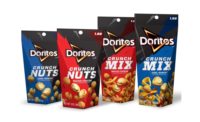COOL Peanuts?
The SFA says seafood exemption should be applied to peanuts, too.
What do seafood and peanuts have in common? More than you think. And those similarities mean that peanuts should be exempted from a new federal law requiring food products to be labeled to identify their country of origin.
That, in effect, is the position of the Snack Food Association and other industry groups that submitted comments last month to the U.S. Department of Agriculture’s Agricultural Marketing Service (AMS) urging that shelled, roasted and flavored peanuts be considered a “processed food item” and exempt from those labeling requirements.
“Specifically, we recommend that the definition of ‘processed food item’ used in the Interim Final Rule for Mandatory Country of Origin Labeling (COOL) of Fish and Shellfish be adopted to cover peanuts, as well,” says the letter signed by SFA president and CEO Jim McCarthy and executives of the Peanut and Tree Nut Processors Association, National Confectioners’ Association, and American Peanut Product Manufacturers, Inc.
Under the COOL law passed by Congress, mandatory country-of-origin labeling for beef, lamb, pork, fish, perishable agricultural commodities and peanuts are to take effect on September 30, 2008. In its proposed regulations implementing the law for fish and shellfish, the USDA exempts processed seafood products from the requirements.
“There are striking similarities that compel consistent definition of ‘processed food product’ for seafood and peanut products,” the SFA letter declares, pointing out that both seafood and peanut products are cooked, resulting in a “pronounced chemical and physical change in the raw product that is easily perceived by the consumer.”
“Just as cooking of fish and shellfish is considered a ‘processing’ step beyond mere preparation for retail sale, so should cooking of peanuts,” the SFA contends.
The comments submitted to the agency also point out that like seafood products, peanut products may be restructured to substantially change the consumer product in appearance, mouth feel, and use.
“Most fundamental, the shelling of peanuts represents a substantial physical change that dramatically alters product use,” the SFA notes.
The document also points out that typical peanut “combination products” are “so highly processed that they have also been cooked and structurally altered, demonstrating how highly processed such peanut products are.”
“Peanuts may be cooked in several ways including roasting, frying, and boiling,” the document explains. “These different cooking methods respond to different consumer preferences. Moreover, the various cooking methods yield product changes that are not only materially different from the uncooked peanut, but also materially different from one another in both taste and nutritional content. Therefore, cooking is a processing step that not only changes the character of the peanut, but changes it differently depending upon the cooking method.”
The SFA also mentions that while most peanuts are grown in the United States, there are occasions when crops are such that imported products are used. In those cases, labels would have to reflect the country of origin of those peanuts, imposing a heavy cost on the manufacturer, many of which are small companies.
“The burdens on small peanut processors would be substantial and borne with little regard to the volume of peanuts processed,” the letter explains. With a smaller product volume over which to amortize these costs, small businesses would bear a heavier compliance burden than large peanut processors.
SFA Members Exhibit at All Candy Expo
More than 20 SFA members were among the snack food companies that exhibited at the 2007 All Candy Expo, which ran Sept. 17-19, at McCormick Place in Chicago. The Snack Food Association was represented by president & CEO Jim McCarthy, as well as vice president of operations & membership Chris Clark.
“It’s All About Sweets & Snacks” was the theme of the show, which now is open to snack companies as a result of an agreement negotiated by the SFA and the National Confectioners Association. Candy and snack food buyers, brokers and retailers from around the world attended, visiting nearly 500 exhibitor booths on the expo floor.
Plan now to exhibit at next year’s show, September 22-24, 2008, at McCormick Place in Chicago. For more information, contact Chris Clark at 1-703-836-4500 ext. 218.



